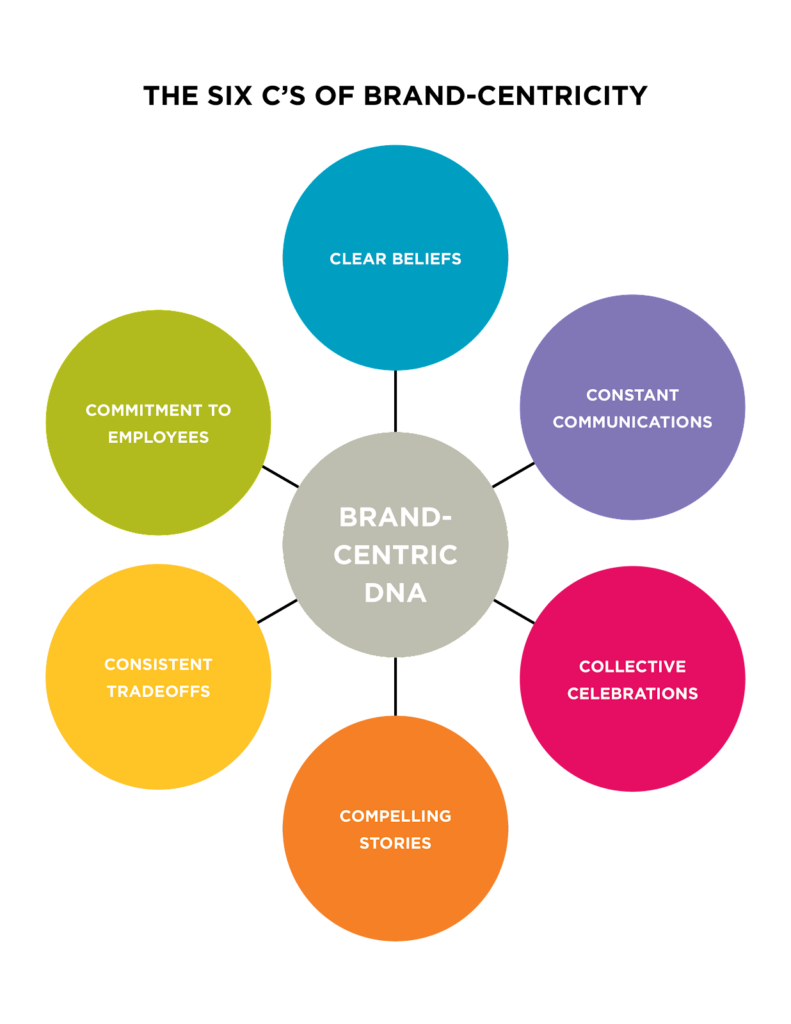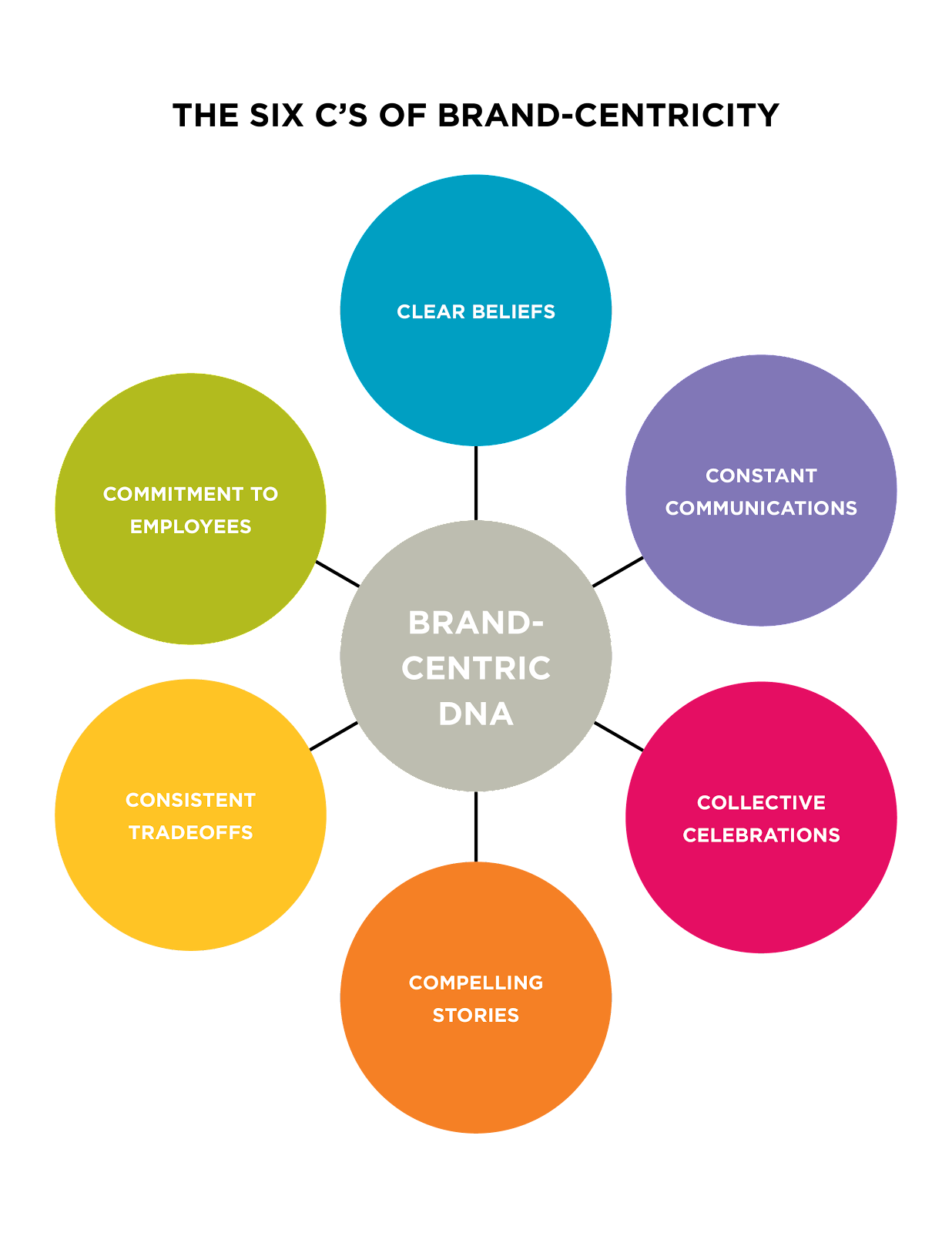For many years, we have coached the “6 C’s of Brand Culture” in our internal branding initiatives. The work is rooted in a Forrester study published more than a decade ago that teased out the six common competencies of the most customer-centric companies in the world. (Forrester. “The Customer Experience Journey, Bruce Temkin. 2008)

Through our brand culture coaching, we have observed these organizations that build corporate “muscles” in turn unleash transformational energy inside the enterprise. We have proven these competencies are skills to be mastered, not native abilities.
I wanted to revisit these 6 C’s and evaluate their prevalence in America’s most reputable corporate cultures today. To do so, I ran an AI-driven search of the country’s best company cultures and what makes them remarkable. Interesting to me–and perhaps to you–was the fact that many of the core competencies showed up again in these companies.
Here’s a digest of what AI found, and what my takeaways are.
Most of the companies that AI (and in this case I’d argue that AI is simply a proxy for the received wisdom of the Internet) rates as tops in culture are well-known, well-established and well-loved American companies. Many are tech behemoths (notable for their off-the-chain employee benefits), but there are retailers, apparel manufacturers and airlines among them as well.
You’ll recognize virtually every one of these brands:
- Adobe
- Airbnb
- Costco
- H-E-B
- HubSpot
- Intuit
- Patagonia
- REI
- Salesforce
- Southwest Airlines
- Warby Parker
- Workday
- Zappos
- Zoom
Clear Beliefs
Top performing cultures all exhibit clear beliefs. The company has a crystal clear ideology and it’s conveyed through mantras, core values, statements of purpose and action. Salesforce, the world’s leading CRM company, is known for its commitment to diversity, equity, and inclusion; the company’s core values include trust, customer success, innovation, and equality. Patagonia (my outdoorsy brother calls it “Pata-Gucci”) makes outdoor apparel and gear; but it’s known for its commitment to environmental and social responsibility. The company’s culture core ideology is to “build the best product, cause no unnecessary harm, use business to inspire and implement solutions to the environmental crisis.”
Collective Celebrations
Perhaps no company culture we have studied exceeds Zappos in celebrating its values, its people and its purpose. Built on the belief that Zappos is in business to “deliver happiness,” it could be any e-commerce company that just happens to sell shoes. YouTube is full of zany, low budget Zappos films of its employees playing games, celebrating core values and remembering mythology like the world’s longest customer service call (now north of 11 hours and seemingly climbing). Southwest Airllines celebrates each other by chartering a “Culture Committee”’ that swoops into airports and takes over the airplane cleaning and resetting function that the flight crew usually does. Flight attendants get a chance to put their feet up for a few minutes while their colleagues pick up the workload. It’s a great way to celebrate the company’s Fun-LUVing Attitude, one of its clear beliefs.
Commitment to Employees
Artificially intelligent search engines regularly identify employee benefits and perks as markers of great corporate cultures. In fact, unlimited vacation leave, paid volunteer time, free lunches, unlimited snacks, napping rooms, fitness centers and generous parental leave policies all bubble up as salubrious culture drivers. These attributes also drive high rankings on “best places to work” surveys. Generous pay and perks alone don’t create culture, however, and the companies that rise to the top of my screen also clearly demonstrate their competency in other domains like purpose beyond profit.
A Sense of Purpose
Our highest performing culture warriors generally also demonstrate a mindset that goes beyond the functional aspects of their businesses. Perhaps the acme is Patagonia, where founder Yvon Chouinard has eschewed the standard playbook from the get-go. Chouinard and Patagonia are more interested in saving the planet than selling the next puffy down jacket and they avow that business is simply one effective means to achieve their aims. Costco, Zoom and Salesforce have committed themselves to reaching carbon neutrality. Airbnb credits its employees with a $2,000 annual travel stipend so they can take full advantage of the company’s service and grow themselves through the joy of travel. Warby Parker commits to social responsibility with Buy a Pair, Give a Pair, which donates a pair of glasses to someone in need for every pair purchased. Such initiatives allow employees to take pride in their workplaces and drive greater meaning into the work.
As a friend and client of mine once told me, “the company with the best talent wins.” It doesn’t really matter what line of work you’re in, the company itself is little more than the people in it. Culture is an integral part of building a high-performance organization. A positive and healthy culture leads to higher employee morale, productivity, and job satisfaction, and ultimately, better business results. Forrester teased it out more than a decade ago and the data just keeps accumulating: methodical, purposeful and intentional culture-building is within reach of any organization and any leadership team that wants to seize the opportunity.

